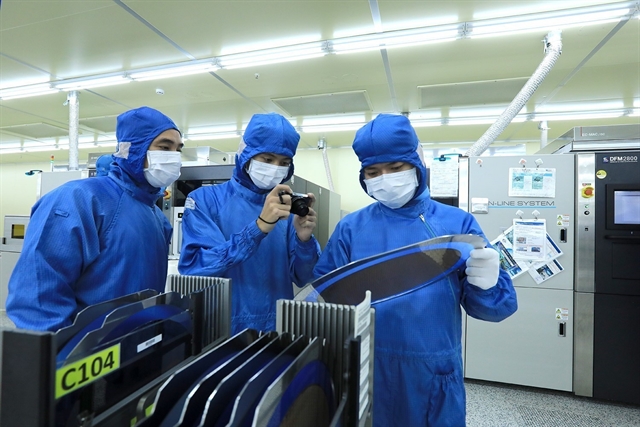VASS Vice President Đặng Xuân Thanh pointed out the successful models of such countries as the Republic of Korea (RoK) and Japan, which Việt Nam can learn from to enhance its competitiveness and integration into global supply chains.

HÀ NỘI — A workshop on promoting the semiconductor industry and energy resources in Việt Nam’s economic reform and opening-up was held in Hà Nội on Tuesday, aiming to assess potential and challenges while proposing development measures in the context of global integration.
The workshop was jointly organised by the Institute of Sustainable Regional Development under the Việt Nam Academy of Social Sciences (VASS), the Korea Institute for International Economic Policy and Korea University. It also served as a platform to connect scientists, businesses and policymakers, helping to shape policies, attract investment and promote sustainable growth.
Speaking at the event, VASS Vice President Đặng Xuân Thanh underlined that the Vietnamese Government has identified the semiconductor industry as a key breakthrough sector, capable of driving the country into a new phase of development.
He pointed out the successful models of such countries as the Republic of Korea (RoK) and Japan, which Việt Nam can learn from to enhance its competitiveness and integration into global supply chains.
Thanh also underscored the importance of rare earth extraction, exploration and processing. He stressed that while utilising rare earth resources can contribute to economic growth, it must be closely connected with environmental protection and energy security, both of which are critical priorities for any nation.
Regarding the energy sector, he highlighted that Việt Nam has introduced several key policies under the Prime Minister’s direction to support sustainable energy development, environmental sustainability and national energy security. However, with ambitious goals ahead, Việt Nam must learn from international experiences to make significant progress in the field.
He noted that this workshop represented an important step in knowledge exchange, cooperation and advancement of a comprehensive development strategy between Việt Nam and the RoK.
Sung Jin Kang, Director of the Institute for Economic Research at Korea University, said the Sustainable Development Index is closely linked to GDP per capita. He emphasised that economic reform and opening-up policies have played a crucial role in driving sustainable development.
This highlights the need for stronger policies supporting businesses, investment in technology and international cooperation to improve competitiveness and long-term sustainability.
Associate Professor Dr. Bùi Quang Tuấn from the Việt Nam Institute of Economics analysed the role of state-owned enterprises (SOEs) in Việt Nam’s economy and the challenges they face. While SOEs continue to play a dominant role in key sectors, Việt Nam is actively working to restructure and enhance their efficiency.
However, Tuấn noted that SOEs still face significant limitations, especially amid international economic integration, digital transformation and growing competitive pressure. He emphasised that continuous reform and deeper global integration are critical for Việt Nam to transition toward sustainable development and strengthen SOEs' competitiveness in the market economy.
Participants at the workshop discussed sustainable development experiences in countries that have undergone economic reform and opening-up while proposing measures to promote sustainable growth in Việt Nam’s evolving economic landscape.
They stressed the importance of economic restructuring, improving investment efficiency and enhancing competitiveness. To achieve its goal of becoming a high-income nation by 2045, Việt Nam must maintain strong economic growth over the long term, they added. — VNS





